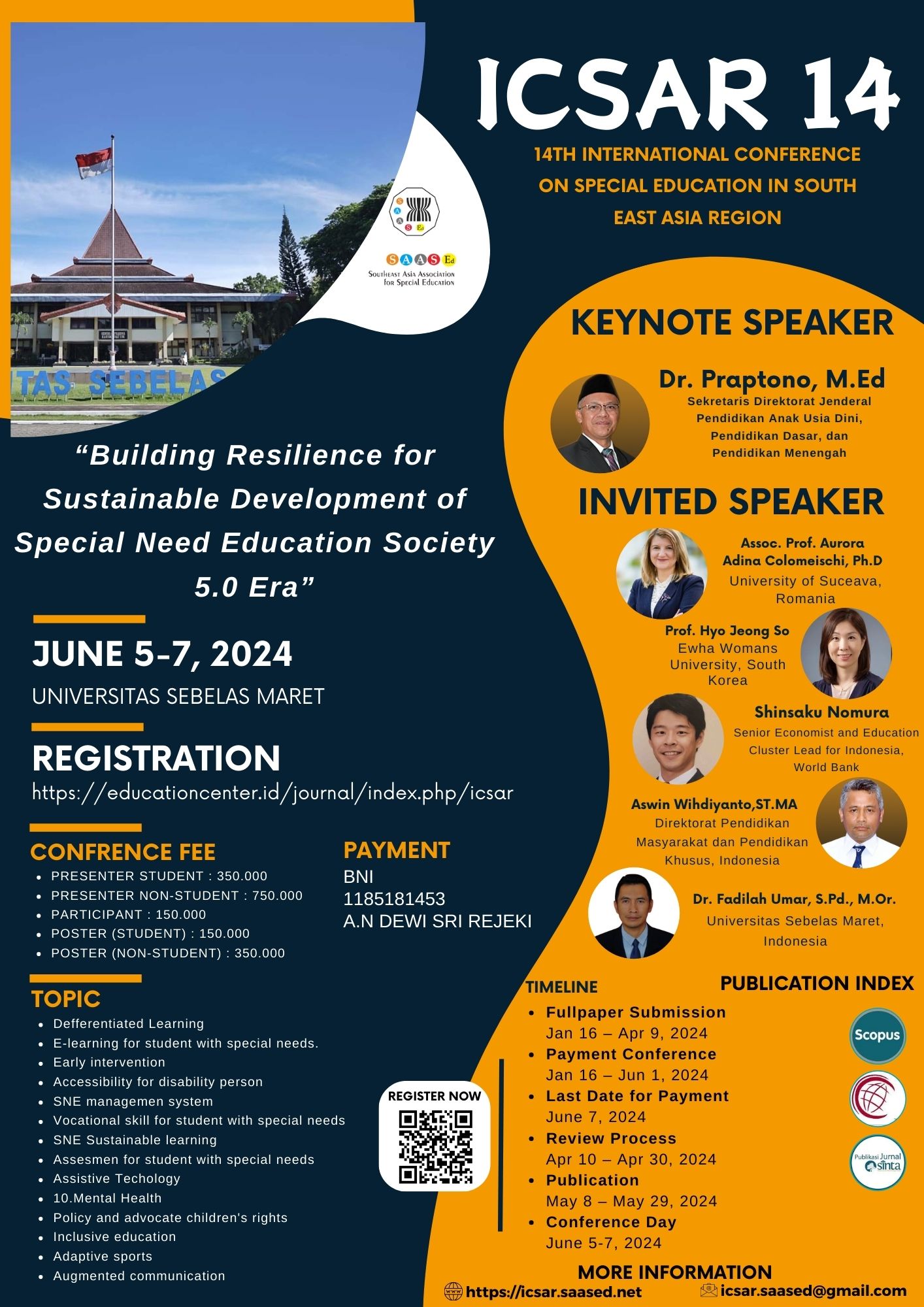Managing Learning Skills to Improve the Learning Quality of Children with Mild Intellectual Disability SLB Sukagalih and SLB ABC YPLAB Lembang, West Bandung Regency, West Java
DOI:
https://doi.org/10.57142/picsar.v1i1.36Keywords:
learning management, learning quality, mild intellectual disabilityAbstract
This study focused on managing learning skills to improve the learning quality of children with mild intellectual disability SLB Sukagalih and SLB ABC YPLAB Lembang, West Bandung Regency, West Java. Vocational learning programs for mild intellectual disability in special high school education units have not been properly managed to meet employment demands. The mismanagement is mainly caused by several factors, including the teachers' skillset that is not suitable for the skills needed in the field, the inadequate facilities and infrastructure, and the management of skills learning has not been carried out as needed. This study aims to determine what management of skills learning will likely improve its quality for children with mild intellectual disability at special needs schools so that the graduates can be accepted in the work field. Data collection was conducted through observation, interviews, and documentation study. The results showed that: 1) the work skills type selection given to students is not entirely based on the work fields’ requirement but rather more often refers to the skills mastered by the teacher, 2) work skills learning implementation has been carried out starting from planning, implementation, evaluation, and follow-up. 3) the obstacles schools and teachers face in implementing skills learning are no available assessment for various work skill types, the children who lack confidence, and lack of trust from the community about their employability. 4) Improvement efforts made by schools and teachers are choosing the skill types suitable to the work field, increasing the teacher's ability to master work-related skills, and establishing cooperation with the job providers. Recommends school and teacher to improve the collaboration with the job providers and make written agreements for both parties to provide a legal foundation in conduct cooperation.
References
Arikunto, S. (2013). Prosedur Penelitian Suatu Pendekatan Praktek. Jakarta: Rineka Cipta
Astati, (2001). Persiapan Pekerjaan PenyandangTunagrahita. Bandung. CV Pendawa.
Aryanto dan Tutik Rachmawati, (2015). Suvervisi Pembelajaran, Jogjakarta, Gava Media
Bounds, G. Yorkas, L., Adams, M., and Ranney, G. (1994). Beyond Total Quality Management, New York: McGraw-Hill
Departemen Pendidikan Indonesia, Kamus Besar Bahasa Indonesia, (2001). Balai Pustaka.
Dimyati & Mudjiono, (2006), Belajar dan Pembelajaran, Jakarta: Rineka Cipta
Fattah, Nanang, (1996), Landasan Manajemen Pendidikan, Bandung: PT Remaja. Rosdakarya
Hamalik, Oemar. 2008. Kurikulum dan Pembelajaran. Jakarta: Sinar Grafika
Handoko, T., Hani, 1998, Manajemen dan Sumber Daya Manusia, Yogyakarta, Liberty
Hunt, Gilbert H.,et.all. (1999). Effective Teaching, Preparation and Implementation. Illionis: Charles C. Thomas Publiser.
Kamil, Mustofa, (2010) Model Pendidikan dan Latihan (Konsep dan Aplikasi). Bandung. Alphabeta
Madjid, Abdul, (2011), Perencanaan Pembelajaran Mengembangkan Standar Kompetensi Guru, Bandung: Remaja Rosda Karya
Mukhtar, (2011). Desain Program Vokasional dan Bimbingan Karir untuk Siswa SMALB. Bandung. Universitas Pendidikan Indonesia. Tidak diterbitkan.
Mulyasa, E .( 2002). Manajemen Pendidikan Sekolah.Bandung: Remaja Rosdakarya.
-------------, (2002), Manajemen Berbasis Sekolah, Konsep, strategi, dan Implementasi, Bandung: Remaja rosda Karya
Mulyasana, Dedy. (2011). Pendidikan Bermutu dan Berdaya Saing. Bandung. Remaja Rosda Karya
Nasution. 2011. Metode Research Penelitian Ilmiah. Jakarta: PT Bumi Aksara.
Purwanto, A.Ngalim. (2001). Prinsip-Prinsip dan Teknik Evaluasi Pengajaran. Bandung: PT. Remaja Rosdakarya.
Priyono. 2007. Pengantar Manajemen. Sidoarjo: Zifatama Publisher
Sagala, Syaiful. (2009). Kemampuan Profesional Guru dan Tenaga Kependidikan. Bandung: Alfabeta
Sallis, Edward, (2006), Total Quality Manajemen in Education, Jogjakarta: IRCiSoD
Sanusi, Ahmad (2015). Sistem Nilai. Bandung: Nuansa Cendekia.
Andrew E. Sikula. 2000. Manajemen Sumber Daya Manusia. Erlangga. Bandung.
Sudjana, Nana, (2009), Penilaian Proses Belajar Mengajar, Bandung: Remaja Rosda Karya
Suderadjat, H. (2002). Pendidikan Berbasis Luas (BBE) yang Berorientasi Pada Kecakapan Hidup (Life Skill). Bandung: Cipta Cekas Grafika.
Sukarna. 2011. Dasar-Dasar Manajemen. CV.
Sugiyono, (2008), Metode Penelitian Kuantitatif, Kualitatif dan R&D, Bandung: Alfabeta
Mandar Maju. Bandung
------------- (2009). Metode Penelitian Pendidikan. Bandung: Alfabeta.
--------------, (2014) Metode Penelitian Manajemen. Bandung: Alfabeta.
Sukmadinata, Nana Syaodih. (2010). Landasan Psikologi Proses Pendidikan. Bandung: PT Remajas Rosdakarya
Terry, George, (1977), Prinsip-prinsip Manajemen, Jakarta: PT. Bumi Aksara
-------, George R., (2006). Asas-Asas Menejemen. Bandung: PT ALUMNI, Terjemahan oleh Winardi dari Principles of Management. Illinois U.S.A.: Ricard D Irwin Inc. Homewood,1977.
---------, George R. 2009. Prinsip-prinsip Manajemen. Jakarta: Penerbit Bumi Aksara
Uno, Hamzah B, (2007), Model Pembelajaran Menciptakan Proses Bel;ajar Mengajar yang Kreatif dan Efektif, Jakarta: Bumi Aksara
Downloads
Published
Versions
- 2024-05-25 (2)
- 2022-09-29 (1)
How to Cite
Issue
Section
Categories
License
Copyright (c) 2022 Angstrom Centre of Education Conference Series

This work is licensed under a Creative Commons Attribution 4.0 International License.





